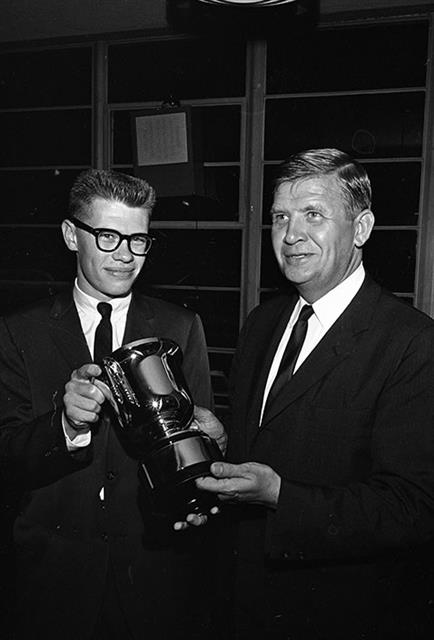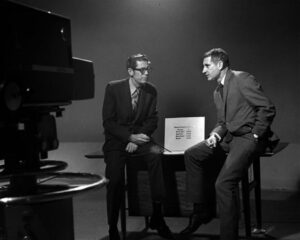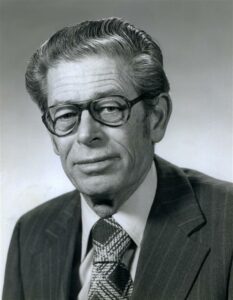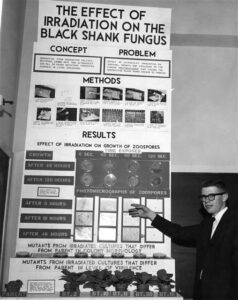
Furney Albert Todd
Father and Son: “Mr. Tobacco” and his accomplished son
The first Furney Albert Todd was born on a tobacco farm near Wendell on Oct. 3, 1921. Before his death on March 3, 1991, he had made a name for himself as the recognized authority on the state’s prized crop – tobacco – and was known in tobacco circles around the world.
His son, Furney Albert ”Bo” Todd Jr., was born Nov. 2, 1944. Before his death at age 18, he had accomplished more than many people who live to an old age. He was an outstanding student who captured a top national science award, earning the recognition of political leaders and the media.
The elder Furney, also known to his family as “Bo,” was eighth of the 11 children of Willie Dowell Todd (1886-1933) and Mamie Frances Baker Todd (1884-1975). Two of his sisters survive: Mamie Frances Ramsey and Ruth Nowell, both of Wendell. Other siblings, now deceased, were: Leona Mae Kelley of Raleigh; Kathleen Nowell of Wendell; R.B. of Carrboro; Lula Grey Bailey of Wendell; Willie of Los Angeles; Leslie, Cedric and Joe, all of Wendell.
Furney’s roots run deep and wide in Wendell. Todds were early landowners in the area that was to become Wendell, coming from Bertie County about 1795. The first elected mayor in 1903 was in the Todd family, as were later mayors and commissioners over the years. Todds were among Wendell’s early merchants and school leaders.
Furney’s father had a large farm, and, according to Furney, he “was a firm believer that young boys should stay employed.” The family grew tobacco, cotton, corn and hay. They also kept a herd of about 12 dairy cows and supplied milk for many people in Wendell, making daily deliveries. Furney was once quoted as saying, “When Dad called us boys about 4 o’clock each morning, six pairs of feet would hit the floor immediately. He meant business when he said, ‘All right, boys, let’s go.’” When a neighbor suggested that the family wasn’t making much money on its dairy operation, Todd’s father replied, “No, but it gives the boys something to do.”
As a student at Wendell High School, Furney displayed leadership abilities and a keen interest in agriculture. He was president of his high school junior and senior class and president of the local Future Farmers of America chapter as well as the county federation. He was a member of the Beta Club.
Furney entered N.C. State in 1939, worked as a laboratory assistant in the Department of Plant Pathology and a full-time technician during the summer. After his 1943 graduation, he entered graduate school at State, completing many graduate courses and his thesis.
His graduate activities were interrupted, however, with a job offer from the U.S. Department of Agriculture as a tobacco plant pathologist. Working in research from 1944 to 1955, he pioneered programs benefiting tobacco production. While Furney enjoyed his 10 years in research, he found research information of no value until it is interpreted in simple language and applied by industry and growers. That opportunity came along for Furney in 1955 when a new position as extension plant pathologist was established at N.C. State. It’s a position he held until his retirement in March 1981, along the way adding the title of Distinguished Professor of Plant Pathology.
Furney took research to tobacco fields throughout the state in his program he called “Extension – Research on Wheels” or E-ROW. Research funds were not available initially, so Furney purchased a secondhand truck and went to work. His first chemical soil treatments were applied with equipment mounted on a mule-drawn plow. He completed 10 demonstration projects the first ar.
The program grew from modest beginnings to use sophisticated mobile equipment and to a staff of 10 technicians and two secretaries, growing to complete 60 to 70 applied experimental replicated tests on problem sites annually throughout the flue-cured and burley belts. Through this program, Furney coordinated one of the most extensive educational efforts on plant disease control that has been conducted in the United States. This unusual program was a cooperative venture joining research and extension with industry, county agents and farmers.
The E-ROW program was well known internationally. In 1977, representatives from 25 countries participated in Furney’s annual tour of 66 tests, located in 40 counties. Furney designed special programs to disseminate information and encourage industry and grower acceptance. In addition to E-ROW, there were R-9-P – Reduce 9 Pests; R-Y-T – Rotate Your Tobacco; K.O.M – Knock Out Mosaic; and T.T.B. – Treat Those Beds.
Furney’s nephew, Jim Bailey of Wendell, is a retired minister. Jim discovered that folks all around knew Furney.
“I served mostly rural or small town churches as a United Methodist minister in Eastern North Carolina for 27 years,” Bailey began. “Many of the church members were farmers. Whenever I would mention that Furney Todd was my uncle, they readily approved of me as their minister. Furney was my best reference.”
Bailey continued, “He was always there for tobacco farmers with their concerns and needs. They had great respect for his knowledge on tobacco issues, and he was always there to share his knowledge and experience with them. Furney helped so many people with their livelihood and did so in a very caring and humble way. Even with all the knowledge Furney had, he was able to help the farmers understand what they needed to do for their crop. He would work side by side with the farmers to follow through on their needs.”
Bailey said that he never met anyone who did not like working with Furney.
“He was a true caring friend to everyone he met,” Bailey said. “He could talk to anybody on any level and whatever he said was genuine and sincere. I am thankful and honored that Furney Todd was my uncle!”



Not only was Furney known by farmers and industry, he was widely recognized by the general public because of his frequent radio, television and public appearances, which often started with his familiar “Howdy Folks.” He had the ability to provide information in a friendly and engaging manner. He prepared and presented more than 3,200 radio programs during his career and made approximately 50 TV appearances each year.
Furney shared his knowledge not only in the tobacco field and on radio and television, but also through the written word. He authored or co-authored approximately 700 scientific journal articles, Ag Extension bulletins, brochures, leaflets and articles in farm magazines and newspapers. In addition, in 1981 he published a first-of-its-kind textbook titled “Flue-Cured Tobacco – Producing a Healthy Crop.”
Furney’s expertise was known throughout the world. He was asked to visit Germany, France and Switzerland to advise tobacco growers during a 1960 outbreak of blue mold. In 1970 he was invited to speak at the International Tobacco Congress in Hamburg, West Germany.
Often referred to as “Mr. Tobacco” by his friends in the industry, Furney received many honors including the N.C. State University Outstanding Extension Award in 1972. He was named Tar Heel of the Week by the Raleigh News and Observer and had featured profiles in the Southern Tobacco Journal and the Flue-Cured Tobacco Farmer, was Man of the Year in The Progressive Farmer and Tobacco Science International, and was named a Philip Morris Extension Specialist and a fellow in the American Phytopathological Society.
Once asked about his hobbies, Furney quickly answered that tobacco was his hobby.
He was quoting as saying, “No man ever lived who enjoyed his job any better than I do – no man.”
On the home front, Furney’s wife quietly kept things going, supporting the activities of her husband and children. Furney and his wife, the former Ann Liles of Zebulon, were married in 1943. Born to this union were Furney “Bo” Jr.; Anitra of Raleigh, married to Arthur M. Wiencken Jr.; Judy of Wendell, married to Dan Edwards; Beth of Wilson, married to Ralph White; and Richard of Wendell, married to the former Kim Johnson. Richard is carrying on the Todd family farm. Furney once said: “I have very little to do with the crop at home. My son is a good tobacco farmer.”
Today there are eight grandchildren and 10 great-grandchildren and counting. One grandchild is named Beau in honor of his grandfather and uncle.
Active in church and community affairs, Furney was president of the local Parent-Teacher Association and chairman of the local school board. At Wendell Baptist Church, he was a deacon and served 30 years as Sunday School superintendent.
At Furney’s death in 1991, agricultural journalist and his friend Bill Humphries wrote, “In his professional involvement with 47 tobacco crops – from 1944 into Spring 1991 – Furney A. Todd was instrumental in adding many, many millions of dollars to the incomes of leaf growers in North Carolina and other states. He felt a responsibility not only to make the right information available, but to persuade as many farmers as possible, as rapidly as possible, to put that information to practical use If any political, military or even religious leader in North Carolina history ever took his life work more seriously than did Furney Todd, that individual’s name fails to come to mind.”
At Furney’s funeral, 33 farmers with their tractors lined up at the cemetery to bid him farewell.
Like his father and so many Todd generations before him, the younger Bo grew up in Wendell. At Wendell High School, he followed in his father’s footsteps. He was a leader with a bright future, planning to take his father’s lead and study plant pathology at N.C. State.
While earlier recognized on the district and state levels in science fair competition, it was Bo’s project in his junior year that propelled him into the limelight. His project topic was the effect of irradiation on black shank fungus in tobacco. That project earned first place at the state science fair and second place in the biological science division at the national science fair held in connection with the Seattle World’s Fair in 1962. Competition included entries from 45 of the states, Japan, Germany and Puerto Rico.
Cleo Perry, Bo’s science teacher, and her husband, Elwood, accompanied Bo to Seattle. When they returned home, a large number of Wendell citizens, including Wendell’s mayor, Ira Johnson, met them at the Raleigh-Durham Airport. Schoolmates, friends and neighbors welcomed him by singing “For He’s a Jolly Good Fellow” and the Wendell High School song.
A few weeks later, Gov. Terry Sanford joined Wendell citizens in saluting Bo at a banquet in the Wendell School cafeteria. Along with Gov. Sanford, others honoring Bo were Proc Dean, president of the Wendell Lions Club; Ronald Berry, Wendell School principal; and Bourke Bilisoly, president of the Wendell Rotary Club. The recognition continued when Gov. Sanford welcomed Bo, his sister, Anitra, who was also a science fair winner at the state level, and 28 other science and math contest winners from throughout the state to a banquet in their honor at the Executive Mansion. According to a newspaper account, “Gov. Sanford quipped that the press had compared the banquet to President Kennedy’s entertainment of Nobel Prize winners at the White House.”
Following his exciting junior year, Bo continued his leadership role at Wendell High School. He was president of his senior class, as he had been for the junior class, and was president of the Student Council. He served as president of the local Future Farmers of America for three of his four high school years. He was president of the National Honor Society and the Beta Club and was co-captain of the football team. His classmates named him to three senior class superlatives: Best All Around, Most Popular and Most Likely to Succeed.
A year after winning national/international science honors and just days before his planned high school graduation, Bo died in a tragic accident on a farm tractor. His family, friends and neighbors who had celebrated his achievement a year earlier were forced to come to terms with his death, a promising life cut short.
Jesse Helms, vice president of news, public affairs and programming at WRAL-TV, presented an on-air tribute to Bo during his May 27, 1963, Viewpoint editorial. In part, it said: “Bo Todd was easily the most remarkable young man we ever knew. The yardstick with which he measured the meaningful things of life is available to all young people. Maybe all that Bo Todd really did was count his blessings and make the most of them. But if in his cheerful, dedicated way he imbued other young minds around him with the same worthy purposefulness, then he neither lived nor died in vain.”
Two men named Furney Albert Todd, father and son. Both men called Wendell home. And they both put Wendell on the map.
by Mary Jo Cashion – June 2016
